The Caretaker was a long-running project by English ambient musician, James Leyland Kirby. His work as the Caretaker is characterized as exploring memory and its gradual deterioration, nostalgia, and melancholia. The project was initially inspired by the haunted ballroom scene in the 1980 film The Shining, the 1978 TV show Pennies from Heaven, and the 1962 film Carnival of Souls. His first several releases comprised treated and manipulated samples of 1930s ballroom pop recordings. Most of his album covers were painted by one of his friends, Ivan Seal.
V/Vm was an alias of English musician Leyland James Kirby, used for producing experimental music. Although starting out mainly in the style of noise music, most releases under the V/Vm alias were plunderphonics, with some original compositions. Most, but not all, of V/Vm's music was released under the V/Vm Test Records label. Alongside the work of the V/Vm project, Kirby also recorded as The Caretaker. He currently resides in Kraków.

Sick-Love is the debut remix album by V/Vm, an alias of English musician Leyland Kirby. Released in 2000, it samples several 1960s-1990s pop songs about love, distorting them to create a sinister atmosphere. The album is mostly unavailable physically because of copyright laws; V/Vm later released the similar album The Green Door. Met with a positive reception from music critics, the album and its single received airplay on various radio stations, achieving the NME title of single of the week.
Ivan Seal is an English painter and sound artist who specializes in surreal and abstract works centered around concepts of memory and the creation of imagined objects. He is best known for his collaborations with electronic musician James Leyland Kirby, also known as The Caretaker, creating artwork for the critically acclaimed albums: An Empty Bliss Beyond This World and the six part album series Everywhere at the End of Time, both of which examine themes of memory loss through the long-term mental decay brought about by dementia.
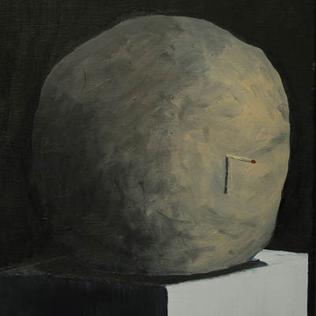
An Empty Bliss Beyond This World is the ninth studio album by the Caretaker, an ambient music project of English musician Leyland Kirby, released on 1 June 2011 through History Always Favours the Winners.

Algiers is an American-English post-punk band from Atlanta, Georgia, United States, formed in 2012. The band consists of multi-instrumentalists Franklin James Fisher, Ryan Mahan, Lee Tesche, and Matt Tong. Algiers pulls from a divergent number of musical influences; the most notable of which being post-punk, hip-hop, Southern Gothic literature, and the concept of the Other. Their sound has been described as dystopian soul due to its somber mood, afrofolk inspired vocal approach, and heavy emphasis on atonal textures.
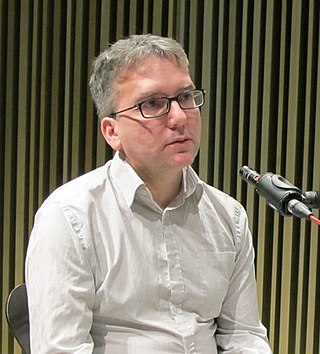
Mark Fisher, also known under his blogging alias k-punk, was an English writer, music critic, political and cultural theorist, philosopher, and teacher based in the Department of Visual Cultures at Goldsmiths, University of London. He initially achieved acclaim for his blogging as k-punk in the early 2000s, and was known for his writing on radical politics, music, and popular culture.
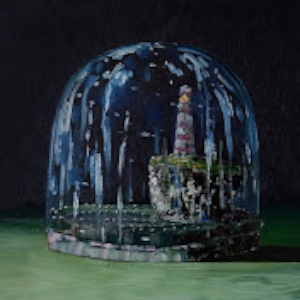
The soundtrack for Patience (2012), a film by Grant Gee, was composed and produced by English musician Leyland James Kirby under his ambient music project the Caretaker. The official soundtrack album was issued on 23 January 2012. Unlike other albums of the Caretaker that used old recordings of playful and bright ballroom music, Kirby's score for the film uses a 1927 recording of Franz Schubert's song cycle for voice and piano Winterreise (1828) as its main audio source. It also differs from other works of the project where hissing sounds are used instead of crackles, the loops are shorter in lengths, and the non-musical aspects of each track serve as the foreground of the mix. The soundtrack was favorably received by professional music journalists.

Hauntology is a music genre or a loosely defined stylistic feature that evokes cultural memory and aesthetics of the past. It developed in the 2000s primarily among British electronic musicians, and typically draws on British cultural sources from the 1940s to the 1960s, including library music, film and TV soundtracks, psychedelia, and public information films; often through the use of sampling.
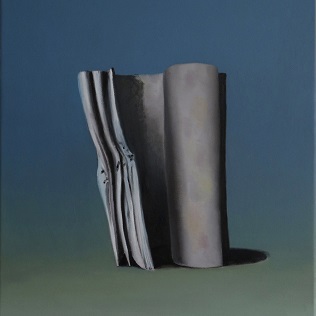
Everywhere at the End of Time is the eleventh recording by the Caretaker, an alias of English electronic musician Leyland Kirby. Released between 2016 and 2019, its six studio albums use degrading loops of sampled ballroom music to portray the progression of dementia and related neurological conditions. Inspired by the success of An Empty Bliss Beyond This World (2011), Kirby produced Everywhere as his final major work under the alias. The albums were produced in Kraków and released over six-month periods to "give a sense of time passing", with abstract album covers by his friend Ivan Seal. The series drew comparisons to the works of composer William Basinski and electronic musician Burial, while the later stages were influenced by avant-gardist composer John Cage.
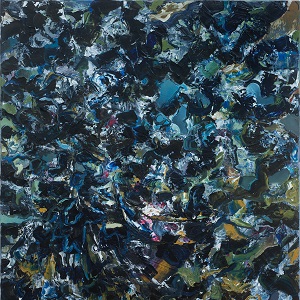
Everywhere, an Empty Bliss is the twelfth release by the Caretaker, an alias of English musician Leyland Kirby. Released on February 26, 2019, the record is compiled from archived tracks that were meant to be used on the Caretaker's albums. Before finishing his album series Everywhere at the End of Time, Kirby released the album as "a surprise golden farewell".

We, So Tired of All the Darkness in Our Lives is the seventh studio album by English musician Leyland Kirby, released on 28 September 2017. An electronic album, it features melancholic and gothic elements. It was produced the same time as Stage 4, and released the same day as Stage 3, of Kirby's album series under the Caretaker moniker, Everywhere at the End of Time. We, So Tired of All the Darkness in Our Lives contrasts from the Caretaker's work in that it is more positive; aspects such as drums mimicking a sound of marching are present. The album's title is a reference to the Joe Jackson song Steppin' Out.
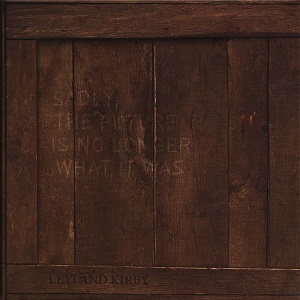
Sadly, the Future Is No Longer What It Was is the debut studio album by English musician Leyland Kirby, released on 1 September 2009. With his ongoing aliases at the time, Kirby produced a melancholic album that explored thoughts of the future. He produced Sadly at an agitated time, when he would not work but rather drink with various girls. The record was first issued as three full-length CDs and would later be repressed as six vinyls with artwork by Ivan Seal. The release received moderately positive reception from music critics. Some criticized its length, while others praised its emotional sound.

Selected Memories from the Haunted Ballroom is the debut studio album by the Caretaker, an alias of musician Leyland Kirby. Released in 1999, it consists of an influence from the horror film The Shining, manipulating songs from the 1920s to resemble the film's music. It differed from Kirby's earlier works in that it did not manipulate pop songs to create noise albums, as he did under the V/Vm alias. It rather slowed down big band records to create a hauntological atmosphere. However, the packaging was the same as other V/Vm releases. The album was met with positivity from music critics, who praised its hauntological themes.

We'll All Go Riding on a Rainbow is the third studio album by the Caretaker, an alias of musician Leyland Kirby. Released in 2003, it was the last of Kirby's "haunted ballroom trilogy", which spans his albums influenced by the film The Shining. It features distorted melodies from the 20th century to recreate the ambience of The Shining's ballroom. We'll All Go Riding on a Rainbow was met with positive reception from music critics, who praised its themes of the paranormal. Kirby's next album as the Caretaker, Theoretically Pure Anterograde Amnesia (2005) would abandon the haunted ballroom concept and install themes of memory loss.

A Stairway to the Stars is the second studio album by the Caretaker, an alias of musician Leyland Kirby. Released in 2001, it was created after one of Kirby's pop manipulations as V/Vm gained attention. Following Selected Memories from the Haunted Ballroom, A Stairway to the Stars features new genres such as darkwave and elements such as reversed vocals. The record was met with positivity from music critics, who praised its ambiance. It is regarded as Kirby's best album in his haunted ballroom trilogy, which spans his first three releases.

Persistent Repetition of Phrases is the seventh studio album by the Caretaker, an alias of musician Leyland Kirby. Released on 1 April 2008, it was his first record to cover themes of Alzheimer's disease. The album was also the first Caretaker release to present looping of short segments within tracks. It marked Kirby's change of record labels from V/Vm Test to History Always Favours the Winners, which he felt might have helped with the record's success.
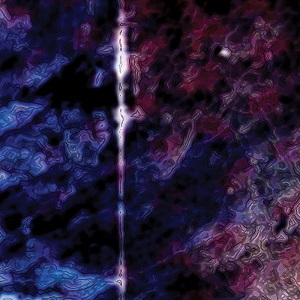
Theoretically Pure Anterograde Amnesia is the fourth studio album by the Caretaker, an alias of musician Leyland Kirby. Released in 2005, it abandoned the haunted ballroom aesthetic of the previous albums and explored memory loss. Divided into six CDs, it consists of seventy-two drone tracks combined to create an almost four hour long release. It was compared by several critics to other musicians, including Merzbow, Boards of Canada, and Krzysztof Penderecki.

Eager to Tear Apart the Stars is the second studio album by English electronic musician Leyland Kirby, released on 3 October 2011. Following his own name debut album Sadly, the Future Is No Longer What It Was, Kirby continued exploring a more personal side of his music, though one that differs from his work as the Caretaker. Kirby produced the songs without using any samples, mostly creating piano tracks from synthesisers. This style of sound drew comparisons to the work of composers Harold Budd and Roedelius, though the record's press release claimed Kirby has his own oeuvre.
Caterina Barbieri is an Italian composer and musician.

















